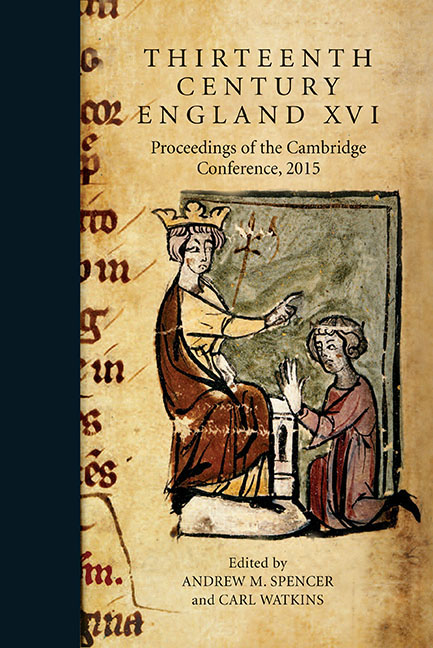Book contents
- Frontmatter
- CONTENTS
- List of Illustrations
- List of Contributors
- List of Abbreviations
- Introduction
- The Uncertainties of Reformers: Collective Anxieties and Strategic Discourses
- Moral Dilemmas in English Confessors’ Manuals
- Damnatio Eternae Mortis or Medicinalis Non Mortalis: The Ambiguities of Excommunication in Thirteenth-Century England
- The Contribution of Thomas Docking to the History of Political Thought
- Dealing with Inadequate Kingship: Uncertain Responses from Magna Carta to Deposition, 1199–1327
- The Rebel's Four Dilemmas in the Long Thirteenth Century
- The Daughters of William the Lion and Queen Ermengarde
- Simon de Montfort and the Ambiguity of Ethnicity in Thirteenth-Century Politics
- The Hue and Cry in Thirteenth-Century England
- Recalling Anglo-Scottish Relations in 1291: Historical Knowledge, Monastic Memory and the Edwardian Inquests
The Rebel's Four Dilemmas in the Long Thirteenth Century
Published online by Cambridge University Press: 23 August 2019
- Frontmatter
- CONTENTS
- List of Illustrations
- List of Contributors
- List of Abbreviations
- Introduction
- The Uncertainties of Reformers: Collective Anxieties and Strategic Discourses
- Moral Dilemmas in English Confessors’ Manuals
- Damnatio Eternae Mortis or Medicinalis Non Mortalis: The Ambiguities of Excommunication in Thirteenth-Century England
- The Contribution of Thomas Docking to the History of Political Thought
- Dealing with Inadequate Kingship: Uncertain Responses from Magna Carta to Deposition, 1199–1327
- The Rebel's Four Dilemmas in the Long Thirteenth Century
- The Daughters of William the Lion and Queen Ermengarde
- Simon de Montfort and the Ambiguity of Ethnicity in Thirteenth-Century Politics
- The Hue and Cry in Thirteenth-Century England
- Recalling Anglo-Scottish Relations in 1291: Historical Knowledge, Monastic Memory and the Edwardian Inquests
Summary
On Tuesday 27 June 1217, England's newly established regency government despatched a letter close to Gloucestershire's sheriff informing him that Geoffrey de Longchamp, a local knight, had now returned to ‘the faith and service of the Lord King’. The letter went on to authorise the full restoration of the former rebel's confiscated lands. Longchamp, who had been opposed to the crown since at least December 1215, was just one of the many hundreds if not thousands who had taken up arms against King John. Rebellion though, as Longchamp and his fellow rebels had discovered, was an inherently risky undertaking. Success was far from certain as many competing variables could quickly alter the course of a rebellion: the vagaries of battle, unexpected events or even personality clashes amongst its leadership were just some of the factors that could affect its eventual outcome. Moreover, if a rebellion ultimately proved ill-fated then its supporters would likely suffer some form of retribution. Thus the would-be rebel needed to give careful consideration to the likely consequences that would arise from his personal participation in the enterprise. Assessing the potential risks associated with rebellion and then weighing them against the possible benefits that might accrue from direct involvement constituted an important element in his deliberations. The prospective rebel would also reflect upon the various strategies that he could employ in order to minimise the known risks that attended any contemporary rebellious movement. My purpose here is to explore the four principal dilemmas that Longchamp and every other thirteenth-century rebel faced, examine the possible alternatives available to him and analyse his resultant decisions’ concomitant risks and benefits.
Rebellion in the Middle Ages encompassed many different forms of resistance within its scope. Communal mass movements, such as the Shepherds’ Crusade of 1251 or the Peasants’ Revolt of 1381, directly challenged the existing hierarchical social structures in both the temporal and secular spheres respectively. Cathedral chapters frequently defied episcopal authority: at Lincoln during the early 1240s, for example, Bishop Grosseteste was locked in a bitter dispute with the dean and chapter concerning his controversial claim to visitation rights over them. Elsewhere, within the sheltered world of the cloister, monks or nuns often chafed against the restraints inherent in a life of continual obedience and openly resisted abbatial authority.
- Type
- Chapter
- Information
- Thirteenth Century England XVIProceedings of the Cambridge Conference, 2015, pp. 89 - 112Publisher: Boydell & BrewerPrint publication year: 2017



